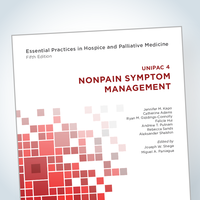Submitted by Angie Forbes on
This book emphasizes the use of symptom assessment tools and goal-oriented decision making with patients and families when treating nonpain symptoms. Symptoms covered include dyspnea, dysphagia, anorexia-cachexia, fatigue, nausea and vomiting, malignant bowel obstructions, delirium, and emergent conditions. The latest pharmacologic and nonpharmacologic interventions for each symptom is covered.
Upon completion of this self-study program the learner should be better able to
- recognize the importance of using symptom assessment tools to ensure comprehensive data collection and objective comparison between patient encounters
- assess and provide effective interventions for dyspnea, including
- nonpharmacologic management of dyspnea
- pharmacologic management of dyspnea
- management of pulmonary congestion and secretions
- refractory dyspnea and proportional palliative sedation
- compassionate ventilator withdrawal
- assess and provide effective interventions for dysphagia, including
- nonpharmacologic management of dysphagia
- pharmacologic management of dysphagia
- surgical interventions for irreversible dysphagia
- assess and provide effective interventions for anorexia-cachexia, including
- treating reversible causes of anorexia-cachexia
- pharmacologic management of anorexia-cachexia
- role of artificial nutrition and hydration
- assess and provide effective interventions for fatigue, including
- nonpharmacologic management of fatigue
- pharmacologic management of fatigue
- assess and provide effective interventions for nausea and vomiting, including
- pathophysiology and etiology of nausea and vomiting
- nonpharmacologic management of nausea and vomiting
- pharmacologic management of nausea and vomiting
- alternative routes of medication delivery
- assess and provide effective interventions for malignant bowel obstruction, including
- managing constipation and fecal impaction
- pharmacologic management of malignant bowel obstruction
- procedural interventions for malignant bowel obstruction
- assess and provide effective interventions for delirium, including
- definition of etiology
- reversing treatable causes of delirium
- nonpharmacologic management of delirium
- pharmacologic management of delirium
- assess and provide effective interventions for emergent conditions, including
- airway obstruction
- cardiac tamponade
- massive hemorrhage
- hypercalcemia
- pathologic fracture
- spinal cord compression
- seizures
- superior vena cava syndrome
- urinary retention.
Authors:
Jennifer Kapo, MD
Felicia Hui, MD
Ryan Giddings-Connolly, MD
Aleksander Shalshin, MD
Andrew Putnam, MD
Catherine Adams, MD PhD
Rebecca Sands, DO
No CME credits available
Member Price: $65
List Price: $85

